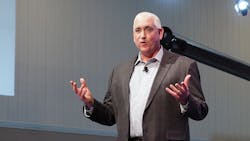New Transit Connect Cargo Van packs more advanced tech, fuel options
INDIANAPOLIS. Having run through updates across its commercial vehicle lineup over the last four years, Ford Motor Co. showed off the 2019 Transit Connect Cargo Van prior to the official open of the Work Truck Show on Wednesday. The automaker's smallest commercial vehicle will offer a turbo diesel engine option and has a slew of advanced safety features as standard, among other highlights.
The new diesel is called the EcoBlue, and Ford noted it's the only such option in the segment. While specs on the 1.5L engine are still estimates, the target is 120 hp and 200 lbs.-ft. of torque, with 90-95% of that available at a low 1500 rpm and max torque available from 1,750-2,750 rpm.
Ford also expects at least 30 mpg for the diesel. It will have auto start-stop technology and will be paired with a new 8-speed automatic, as will the Cargo Van's standard 2.0L gasoline engine. There's also a fleet-exclusive option for a 2.5L engine that can be prepped for compressed natural gas or propane; that engine comes with a 6-speed automatic.
This is the third generation of the Transit Connect, which Ford launched in the U.S. market first in 2010. The second-gen van, more visually similar to this latest one, arrived in 2014 as a '15 model. With the new Transit Connect, "we're starting all over again" to refresh Ford's entire commercial lineup, said John Ruppert, general manager of commercial vehicle sales and marketing at Ford.
The OEM has now sold over 300,000 of the compact vans, he added, and 97% of them are still on the road. Ford claims a combined fleet and retail market share of 46% for the Transit Connect in the segment. The company pitches the compact van, which is smaller and more maneuverable than its full-sized bigger brother the Transit and industry alternatives in that bracket, as perfect for things like urban delivery, catering, mobile services and more. The short-wheelbase Transit Connect Cargo Van has a turning diameter of 38.3 ft.
A docket of driver-assistance technologies are standard on the '19 Transit Connect Cargo Van. That includes pre-collision assist with pedestrian detection offering a forward-collision warning, automatic emergency braking and dynamic brake support. A side-wind stabilization system also is standard, as is a rearview camera. A blind spot warning system, lane-keeping system and adaptive cruise control with forward radar are available.
"We've enhanced Transit Connect's available technology and powertrains to keep up with what our customers need," said Tim Stoehr, general fleet marketing manager at Ford, in a statement. "It is a critical tool with smart features to help improve productivity out in the field."
The Transit Connect Cargo Van includes some added new convenience tech as well. A standout there is an available wireless smartphone charging system, another segment exclusive Ford touted. An embedded 4GLTE modem that can provide WiFi for up to 10 devices is standard, and a 6.5-inch touchscreen media center is available.
The interior features front seats with a new seat foam that's designed for greater comfort, but there's more news at the rear. Dual sliding side doors offer better access, the rear load floor is finished in vinyl for increased durability, and cargo area walls are nearly vertical and feature integrated tie-downs. The rear doors open 180 degrees and can be locked in the open position. An available tow package gives the compact van towing capability of 2,000 lbs.
This being the Work Truck Show, Ford took the opportunity to showcase the Transit Connect Cargo Van's "substantial" upfit possibilities for things like cargo management shelves and drawers and roof racks.
The 2019 Transit Connect's cargo variant is slated to go on sale this fall.
About the Author
Aaron Marsh
Aaron Marsh is a former senior editor of FleetOwner, who wrote for the publication from 2015 to 2019.
